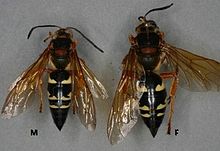| Sphecius speciosus | |
|---|---|

| |
| Adult male (left) and female (right) | |
| Scientific classification | |
| Domain: | Eukaryota |
| Kingdom: | Animalia |
| Phylum: | Arthropoda |
| Class: | Insecta |
| Order: | Hymenoptera |
| Family: | Crabronidae |
| Genus: | Sphecius |
| Species: | S. speciosus
|
| Binomial name | |
| Sphecius speciosus (Drury, 1773)
| |
| Synonyms | |
| |
Sphecius speciosus, often simply referred to as the cicada killer or the cicada hawk, is a large, solitary digger wasp species in the family Crabronidae. The name may be applied to any species of crabronid that preys on cicadas, though in North America, it is typically applied to this species, also referred to as the eastern cicada killer in order to further differentiate it from the multiple other examples of related wasp species. Sometimes, they are called sand hornets,[1] although they are not hornets, which belong to the family Vespidae. This species can be found in the Eastern and Midwest U.S. and southwards into Mexico and Central America. They are so named because they hunt cicadas and provision their nests with them. Cicada killers exert a measure of natural control on cicada populations, and as such, they may directly benefit the deciduous trees upon which the cicadas feed.
The most recent review of this species' biology is found in the posthumously published comprehensive study by noted entomologist Howard Ensign Evans.[2]
- ^ Sciarappa, William (May 2004). "The Cicada Killer Wasp (Rutgers NJAES)". njaes.rutgers.edu. Retrieved 2021-03-30.
- ^ Howard Ensign Evans & Kevin M. O'Neill (2007). The Sand Wasps: Natural History and Behavior. Harvard University Press. pp. 37–43. ISBN 978-0-674-02462-5.